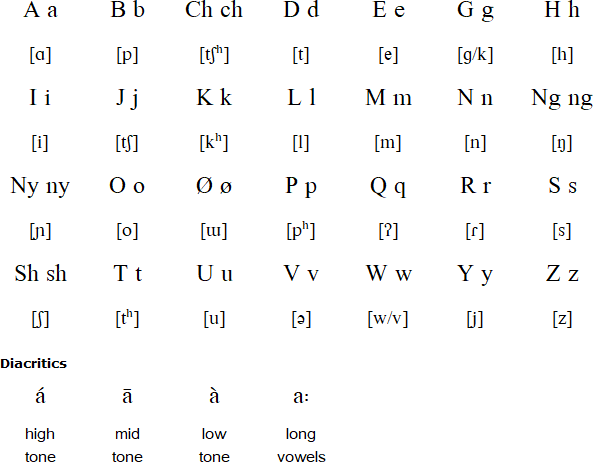Rawang is a member of the Nungish branch of the Sino-Tibetan language family. It is spoken by about 63,000 people mainly in northern Myanmar, and also in southwestern China and northeastern India. In particular, it is spoken in the Mae Hka and and Maeli Hka river valleys in the Putao District in the north of Kachin State in northern Myanmar. In China it is spoken mainly in Gongshan Derung and Nu Autonomous County in the northwest of Yunnan Province, and speakers are known as Dulong. In India it is spoken in the state of Arunachal Pradesh.
Rawang is also known as Krangku, Chiutse, Ch’opa, Ganung-Rawang, Hkanung, Kiutze, Nung, Nung Rawang or Qiuze. Rawang speakers call it Rvwàng [rəwaŋ]. Dialects include Daru-Jerwang, Khrangkhu, Matwang, Tangsar East, Tangsar West and Thaluq.
A way to write Rawang with the Latin alphabet was developed between 1962 and 1963 by Robert H. Morse, an American missionary. It is based on the Matwang dialect, which is considered the standard dialect and is used for communication between different groups of Rawang people.

Download alphabet charts for Rawang (Excel)
Syllables ending in p, t, q or k have a high tone.
Duru vsv̀ngmø̀ng nø carvmàng kv̀y nø vnùng rvmv̀y kv̀y v̀n køq wv́y vmø̀mø̀ pvngpaq yvng yitsí yv́ngé. Vnùng wangdòng wv́y nø Lunggwi rvzì gutlvy Tvrùng wangdòng yvng yitsi yv́ngé. Tvrùng wangdòng kv̀y nø cárvmàng kv̀y Punggrìng v̀n brvt kv̀y mvkø̀mdv́m kv̀y vzǿkòng gvbà ò nø vzǿ lv̀m yv́ngé.
The Duru tribes have been living in the upper part of the Salween River since ancient times and have gradually moved to the lower part of the river. From the Salween River, they passed Long Gwai Mountain and went down to the side of Ta Thang Creek. There is a history that in the past, during the Phong Gren era, they held a big Mano festival in Makhun Dam near Thang River.
Source: https://daruweb.org/rawd/mvsǿn
Source: https://live.bible.is/bible/RAWBIB/LUK/11
Source: https://www.bible.com/bible/1/LUK.11.KJV
Information about Rawang
https://en.wikipedia.org/wiki/Rawang_language
https://fr.wikipedia.org/wiki/Rawang
https://www.webonary.org/rawang/overview/introduction/
https://www.sil.org/resources/search/language/raw
https://archive.org/details/Morse1965
http://olac.ldc.upenn.edu/language/raw
https://digital.library.unt.edu/explore/collections/RWLR/
https://daruweb.org/rawd
https://www.rawang.org/
Angami, Bai, Darmiya, Galo, Miju, Rawang, Tangut, Thangmi, Tujia
Languages written with the Latin alphabet
Page created: 06.11.23. Last modified: 06.11.23
[top]
Why not share this page:

If you like this site and find it useful, you can support it by making a donation via PayPal or Patreon, or by contributing in other ways. Omniglot is how I make my living.
Note: all links on this site to Amazon.com, Amazon.co.uk
and Amazon.fr
are affiliate links. This means I earn a commission if you click on any of them and buy something. So by clicking on these links you can help to support this site.
Get a 30-day Free Trial of Amazon Prime (UK)
If you're looking for home or car insurance in the UK, why not try Policy Expert?
[top]